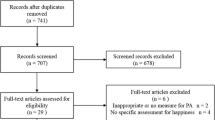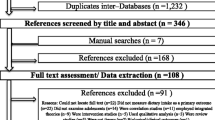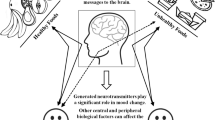Abstract
Background
Positive emotions and happiness may improve health and prolong life. Diet quality, Mediterranean dietary pattern, fruit and vegetable, chocolate, and fish consumption have been linked to positive affect, improved mood, and reduced risk of depression. We examined the associations between diet, nutrition, and perceived happiness in the oldest-old men.
Methods
The participants in this cross-sectional analysis were the oldest-old, home-dwelling men (n = 338, mean age 88 years, range 82–97 years) from the longitudinal Helsinki Businessmen Study cohort. In 2016, a postal health and nutrition survey was performed. Happiness was evaluated using the Visual Analog Scale of Happiness (0–100 mm). The nutrition survey included a 3-day food diary, Mediterranean Diet Adherence score, and Index of Diet Quality designed to measure adherence to Finnish dietary recommendations. The participants were divided into quartiles according to happiness scores, and diet quality scores, food intakes, and other indicators were compared between the happiness quartiles.
Results
Happiness was linearly associated with total fruit and vegetable intakes (p = 0.002) and inversely associated with age (p = 0.016), blood glucose levels (p = 0.049), skipping lunch (p = 0.023), reduced food intake (p = 0.002), and weight loss (p = 0.016).
Conclusions
Fruit and vegetable intakes indicated happiness in the oldest-old men while reduced food intakes and weight loss were inversely associated with happiness. Maintaining good nutrition and increasing fruit and vegetable consumption may be important for psychological health of older people.
Similar content being viewed by others
References
Kim ES, Hagan KA, Grodstein F, DeMeo DL, De Vivo I, Kubzansky LD (2017) Optimism and cause-specific mortality: a prospective cohort study. Am J Epidemiol 185(1):21–29
Barak Y (2006) The immune system and happiness. Autoimmun Rev 5(8):523–527
DuBois CM, Lopez OV, Beale EE, Healy BC, Boehm JK, Huffman JC (2015) Relationships between positive psychological constructs and health outcomes in patients with cardiovascular disease: a systematic review. Int J Cardiol 195:265–280
Ironson G, Banerjee N, Fitch C, Krause N (2018) Positive emotional well-being, health behaviors, and inflammation measured by C-reactive protein. Soc Sci Med 197:235–243
Huffman JC, Legler SR, Boehm JK (2017) Positive psychological well-being and health in patients with heart disease: a brief review. Future Cardiol. https://doi.org/10.2217/fca-2017-0016
Schutte NS, Palanisamy SK, McFarlane JR (2016) The relationship between positive psychological characteristics and longer telomeres. Psychol Health 31(12):1466–1480
Tanskanen A, Hibbeln JR, Tuomilehto J, Uutela A, Haukkala A, Viinamäki H et al (2001) Fish consumption and depressive symptoms in the general population in Finland. Psychiatr Serv 52(4):529–531
Ford PA, Jaceido-Siegl K, Lee JW, Youngberg W, Tonstad S (2013) Intake of Mediterranean foods associated with positive affect and low negative affect. J Psychosom Res 74(2):142–148
Mujcic R, Oswald AJ (2016) Evolution of well-being and happiness after increases in consumption of fruit and vegetables. Am J Public Health 106(8):1504–1510
Slavin JL, Lloyed B, Hammond BR (2012) Health benefits of fruits and vegetables. Adv Nutr 3(4):506–516
Strandberg TE, Salomaa V, Strandberg AY, Vanhanen H, Sarna S, Pitkälä K et al (2016) Cohort profile: the Helsinki Businessmen Study (HBS). Int J Epidemiol 45:1074
Benseñor IM, Pereira AC, Tannuri AC, Valeri CM, Akashi D, Fucciolo DQ et al (1998) Systemic arterial hypertension and psychiatric morbidity in the outpatient care setting of a tertiary hospital. Arq Neuropsiquiatr 56:406–411
Vellas B, Guigoz Y, Garry PJ, Nourhashemi F, Bennahum D, Lauque S, Albarede JL (1999) The Mini Nutritional Assessment (MNA) and its use in grading the nutritional state of elderly patients. Nutrition 15(2):116–122
Martínez-González MA, García-Arellano A, Toledo E, Salas-Salvadó J, Buil-Cosiales P, Corella D et al (2012) A 14-item Mediterranean Diet Assessment Tool and Obesity Indexes among high-risk subjects: the PREDIMED trial. PLoS One 8:e43134
Mäkelä J, Langström H, Laitinen K (2012) Uusi ruokavalion laadun mittari ravitsemusohjauksen tueksi. Lääkärilehti 3:161–163 (in Finnish)
Gomez-Pinilla F, Nguyen TTJ (2012) Natural mood foods: the actions of polyphenols against psychiatric and cognitive disorders. Nutr Neurosci 15(3):127–133
Strandberg TE, Strandberg AY, Pitkälä K, Salomaa VV, Tilvis RS, Miettinen TA (2008) Chocolate, well-being and health among elderly men. Eur J Clin Nutr 62(2):247–253
Helldán A, Raulio S, Kosola M, Tapanainen H, Tapanainen H, Ovaskainen M-L, Virtanen S. Finravinto 2012–tutkimus. The National FINDIET 2012 Survey. Raportti 16/2013, 187 p. Terveyden ja hyvinvoinninlaitos (THL), Helsinki, 2013. (in Finnish)
Medical Research Council (MRC). Dietary Assessment 2018. http://dapa-toolkit.mrc.ac.uk/. Accessed 15 Mar 2018
Acknowledgements
This work was supported by Päivikki and Sakari Sohlberg Foundation and Helsinki University Hospital EVO-funding. The sponsors did not have any role in the study design, analysis or interpretation of data, nor in writing the report or the decision to submit this article. The authors were independent researchers not associated with the funders.
Author information
Authors and Affiliations
Corresponding author
Ethics declarations
Conflict of interest
SKJ: reports no conflict of interest. AU: reports no conflict of interest. KHP: reports no conflict of interest. TES: reports having various educational and consultative cooperation with several companies, including Nutricia, Abbott, Amgen, Merck, Pfizer, Novartis, and Novo-Nordisk; a minor amount of stock in Orion Pharma; and is a board member and former president of executive board of European Union Geriatric Medicine Society which has cooperation also with the nutrition industry.
Ethical approval
The study protocol was approved by the Ethics Committee of the Helsinki University Hospital, Department of Medicine.
Informed consent
Informed consent was obtained from all individual participants included in the study.
Rights and permissions
About this article
Cite this article
Jyväkorpi, S.K., Urtamo, A., Pitkälä, K.H. et al. Happiness of the oldest-old men is associated with fruit and vegetable intakes. Eur Geriatr Med 9, 687–690 (2018). https://doi.org/10.1007/s41999-018-0084-9
Received:
Accepted:
Published:
Issue Date:
DOI: https://doi.org/10.1007/s41999-018-0084-9




